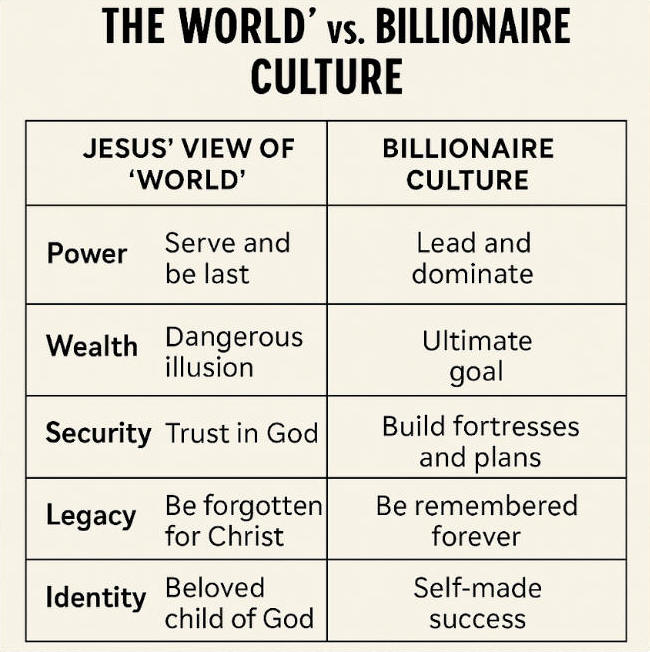How often do we adhere to that notion?
Jesus sometimes contrasted the “world” with the coming Kingdom or Age of God: “The cares of this world, and the deceitfulness of riches…” (Matthew 13:22). The implication is that the world is fleeting and often a distraction from eternal priorities—which assuredly it is.
Compare Jesus’ concept of “the world” to the current culture of celebrities and billionaires, particularly through the lens of values, power, and purpose.
First we have power and pride versus meekness and service: Jesus calls His followers to humility, service, and self-denial. How does that stack up with the billionaires who are currently so rampant and prominent?

The world values status, dominance, and self-assurance (read: arrogance).
Lust versus love. Greed versus gratitude (even for suffering).
“Whoever wants to be first must be last of all and servant of all.” (Mark 9:35). “You cannot serve both God and money.” (Matthew 6:24).
But how people try! They even use religion to pay for private jets.
Modern billionaires? Their culture?
That often celebrates self-made success, power, influence, and ambition. Aren’t we taught this as an ideal? And fame? We can’t seem to resist celebrities–and even create religious ones.
Many billionaires are idolized as visionary leaders who reshape society.
Wealth accumulation is frequently a badge of success and identity.
This is idolatry and more in the camp of Caesar than Jesus.
Contrast that to how Jesus rejected the idea that earthly power or wealth defined greatness: In His view, the “world” values things that ultimately blind people to God.
Call it greed versus the Creed. Call it “Accumulation” versus “Detachment.” Selfish versus selfless. Be careful! Can a rich person be holy? Absolutely. But it is a challenge.
=
Billionaire culture:
That revolves around accumulating assets, “growing” companies, expanding portfolios, and gaining influence.
It often emphasizes technological control, longevity, and legacy projects (like space travel or AI immortality).
Where billionaires often seek to control or extend life, Jesus calls His followers to lose their life for His sake (Matthew 10:39), trusting in God’s Kingdom over human achievement.
Jesus critiqued the illusion that wealth brings security. “Do not lay up for yourselves treasures on earth… but lay up treasures in heaven.” (Matthew 6:19–20). Yet our modern culture does what? Does not the billionaire lifestyle promote ultimate comfort and insulation from risk, with private islands, bodyguards, and disaster bunkers?
